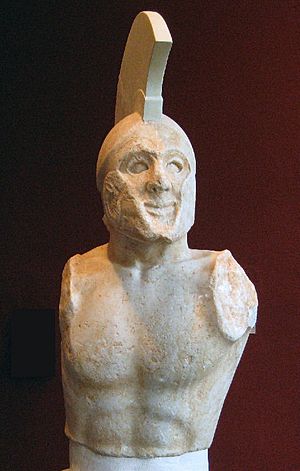Gorgo, Queen of Sparta facts for kids
Gorgo (born around 518-508 BC) was a very smart and important Spartan woman. She was the wife of King Leonidas I, who ruled Sparta from 489 to 480 BC. Gorgo was also the only known child of Cleomenes I, who was King of Sparta before Leonidas. She was the mother of Pleistarchus, her only son with King Leonidas I. Gorgo is one of the few women from ancient history whose name was written down by the famous historian Herodotus. He described her as intelligent and wise.
Contents
Gorgo: A Smart Spartan Woman
Her Early Life and Learning
Gorgo was the only child of King Cleomenes I of Sparta. One famous story from Herodotus's book The Histories shows how clever she was from a young age.
When Gorgo was about eight or nine years old, a man named Aristagoras came to Sparta. He wanted to convince King Cleomenes to attack the huge Persian Empire. Aristagoras talked about how rich Persia was and offered the king a lot of silver as a bribe.
Gorgo saw what was happening. She told her father, "Father, you must leave! This man's gifts will corrupt you!" King Cleomenes listened to his young daughter's wise advice. He left, and Aristagoras had to leave Sparta without getting what he wanted.
Spartan Education for Girls
Spartan girls, including Gorgo, had a special education. They were expected to grow up strong to have healthy Spartan children. Because of this, they trained physically, much like the boys.
Gorgo would have learned sports such as running, discus throwing, javelin throwing, and wrestling. She didn't just learn these sports; she also competed in them. The Spartans believed that if both parents were strong, their children would be strong too.
Besides physical training, Spartan girls also received a good academic education. As a girl from a royal family, Gorgo would have learned to read and write. She also studied arts like music, dance, and poetry. The education for Spartan women was often as good as, or even better than, the education for Spartan men.
Because of this strong training, another historian, Plutarch, tells a story about Gorgo. A foreign woman once told her, "You Spartan women are the only ones who rule your men." Gorgo famously replied, "Yes, because we are the only ones who give birth to men!"
Her Marriage and Influence
After her father, King Cleomenes, died in 489 BC, Gorgo became his only heir. By 490 BC, she was already married to her half-uncle, Leonidas I. Even though she was the daughter and wife of Spartan kings, Gorgo wasn't called a "queen" in the same way we use the word today. Royal women in Sparta didn't usually have a special official role in society. However, Gorgo still had a lot of respect and influence in Spartan politics.
One of Gorgo's most important actions happened just before the Persian invasion in 480 BC. Demaratus, a former Spartan king living in exile in Persia, sent a secret warning to Sparta. He wanted to tell them about Xerxes's plan to invade.
To keep the message secret, Demaratus wrote it on a wooden tablet and then covered it with wax, making it look blank. When the Spartans received the tablet, they were confused. They didn't know what to do with the seemingly empty wax tablet. Gorgo, with her sharp mind, told them to scrape off the wax. When they did, they found the hidden message! This act of cleverness led to her being called one of the first female "cryptanalysts" (someone who decodes secret messages) in history.
Historian Helena P. Schrader believes that King Leonidas I might have taken Gorgo with him when he traveled to other Greek cities to prepare for the war. It was possibly during these travels that Gorgo had her famous conversation with the Athenian woman about Spartan women giving birth to "men."
Before the famous Battle of Thermopylae, where her husband King Leonidas I would bravely fight and die, Gorgo asked him what she should do if he didn't return. Plutarch says Leonidas told her to "marry a good man who will treat you well, bear him children, and live a good life."
Her Son, Pleistarchus
Gorgo and Leonidas I had at least one son named Pleistarchus. He became a co-king of Sparta in 480 BC after his father's death and ruled until his own death in 458 BC.
When King Leonidas I died, Pleistarchus was still very young. So, his uncle Cleombrotus and then his cousin Pausanias acted as his guardians and helped him rule. Pausanias was the general who led the Greek armies to victory at the Battle of Plataea in 479 BC. After Pausanias faced some problems, Pleistarchus continued to rule with the other Spartan king, Leotychidas II, until his death.
See also
 In Spanish: Gorgo para niños
In Spanish: Gorgo para niños
 | Isaac Myers |
 | D. Hamilton Jackson |
 | A. Philip Randolph |


